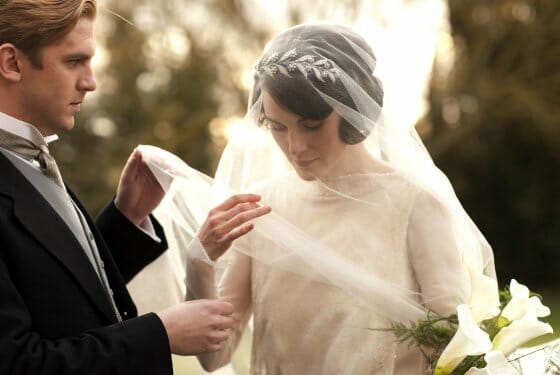
You have to admire the audacity of Downton Abbey’s third season, beginning with a wedding that in many shows would come as a finale. But that didn’t mean the show opted out of a frustrating bit of “will-they/won’t-they,” even after two seasons of that interplay already, and when the wedding finally occurs it… just seems rather unimportant. Perhaps the most jarring thing about season three’s premiere is how same-y it feels to the first two seasons, right down to focusing on yet another baffling inheritance heading toward Cousin Matthew. It’s Downton Abbey still, for sure, and for many people that will be enough. But then, to ask a question raised by the end of the episode, what really is the value of Downton Abbey?
The show seemed, from its beginning, to be a period piece focused on the coming of modernity on an aristocratic estate—that is to say, a thing of the past that has no place in modernity, let alone post-modernity. The initial crisis that called this into question was the inheritance of the estate and the archaic laws that meant it would fall into the hands of another family. Now that the wedding sorted that out, it may need to be sold off so that, once again, it will fall into the hands of another family, because off-camera Lord Grantham lost all his money. To say that this plot point feels both contrived and repetitive would be to understate its frustration. The wedding doesn’t matter because the show has proven unwilling to move beyond this crisis. Even as its theoretical years go by with remarkable speed, Downton Abbey refuses to develop any of its other plots (all of which are conveniently self-contained) enough to have them take over the main story. Like its characters, and its at times reprehensible politics, the show strives to maintain its status quo.
I wish I could give the show credit for dramatizing one of its central themes here, the past refusing to abdicate its throne quietly, but this, as with many other aspects of the premiere, felt like sheer clumsiness. For some reason Julian Fellowes, the auteur and sole writer, has failed to grasp the nature of serial television and instead encased his show in resin, and as a result each season delivers fewer returns than the last. It’s particularly perverse because serial shows are about change; they’re about growth. To take our current favorite, Breaking Bad, as an example, here you have a show about how far a person can go if the circumstances are right. It’s about change, and that’s what makes the show so fascinating and strong. You cannot miss an episode because the situation will never be remotely the same again. Conversely, you can skip the entirety of Downton Abbey’s second season and feel like you’ve hardly missed a beat.
Mary, the bride of the hour, explains this well when she shows up to her wedding and explains to her groom that she would “hate to be predictable.” But, of course, she is, and so is everyone else in the show. While in most shows characters gain dimension as the series continues and we learn their nuances, seeing unexpected virtues and vices make their way to the surface, in Downton people become strangely reduced to mere types. They flatten. What we thought was complexity gets shown to be nothing of the sort.
I’m not certain if this actually has something to do with the show’s draw, since because of this it requires less investment than other serial dramas. Even the few things that change do so slowly and predictably, not to mention repetitively, so that Downton can be watched as casually as Law & Order. Whatever the case, it’s not the show’s strength, which early on we would have supposed was the writing, yet now seems to be merely the production values.
There are still things to like, but they’re becoming fewer as the initial spell of the show, the impact of gorgeous visuals and impeccable design, wears off. What we have on our hands now seems to be a serial show that wishes it wasn’t one. Why doesn’t Downton Abbey the show seem to have much value? Because it’s largely forgotten why it existed in the first place, and no random party will prove an easy fix to that problem, either.
Stray observations:
•The dullest of the dull, though, is easily everything having to do with Bates. I’m guessing this is a less controversial view of the show than everything else I’ve written. While as a person he hasn’t changed, story-wise he went from perhaps the most interesting part of Downton to the least so quickly it made my ears pop. I’m sure I’m not the only one who wishes Bates had actually murdered his wife, simply because it would make all of this a lot more interesting.
•Cousin Matthew has the best inheritance luck of practically anyone, ever. Why even try to do something else? He should just go about his business enjoying life and collecting inheritances when they arrive.
•I’ll probably devote most of another show recap on Downton’s politics, but in short making the one politically active character into an irritating, uncouth clod speaks volumes about the show’s problematic high-conservative values.
•No one Downton has any friends. That makes sense for the aristocrats, and I’m sure is historically accurate, but shouldn’t Cousin Matthew, for instance, have someone better for his best man?